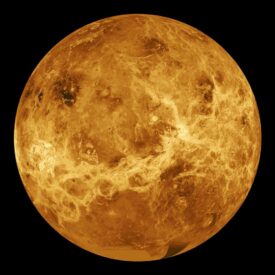Hampton, Va. (Nov. 29, 2022) — In an article published in the journal Geophysical Research Letters, recent Hampton University graduate Dr. Debajyoti Basu Sarkar and Professor, Dr. William B. Moore from the Department of Atmospheric and Planetary Sciences report that rocky planets with a hot surface likely do not have plate tectonics like the Earth. Most of Earth’s surface features and many processes such as earthquakes and volcanism are understood to be the result of the slow motions of vast regions (the plates) over billions of years. But for some still unknown reason, Earth is the only planet that behaves this way.
Understanding other planets requires a different theory, championed by Drs. Moore and Basu Sarkar, in which planetary surfaces are dominated by volcanism, rather than surface motions. This theory is known as planetary heat pipes, named for the volcanic fissures that allow molten rock to rise to the surface and erupt. Most rocky planets seem to have gone through a period of heat pipes before shifting to a different style of planetary behavior as they cooled off – in Earth’s case, but nowhere else, the shift resulted in plate tectonics. In their recent article, this theory is used to understand how Venus’ surface temperature, maintained at almost 900°F by its greenhouse atmosphere, prevented plate tectonics from happening on a planet otherwise very similar to Earth.



“The atmosphere of Venus acts like a blanket, which makes it harder for Venus to lose heat from its rocky mantle,” explained Dr. Basu Sarkar.
The article describes how this insulating effect means Venus cools more slowly and takes almost twice as long to reach the end of its heat pipe phase as Earth. By that point, the energy sources driving motion inside the planet are weaker and are not able to break up the surface and drive the kind of plate motions seen on Earth.
In the paper, the authors say their results can be applied to any planet, including planets that are outside the solar system, that have a rocky surface and thick atmosphere.
“We emphasized the role of surface temperature because it can connect planetary climate with interior processes like volcanism and tectonics,” said Dr. Basu Sarkar. “This means that we can build on our current results and link climate evolution to the dynamics of rocky planets like Earth, Venus, Mars, and exoplanets.”
